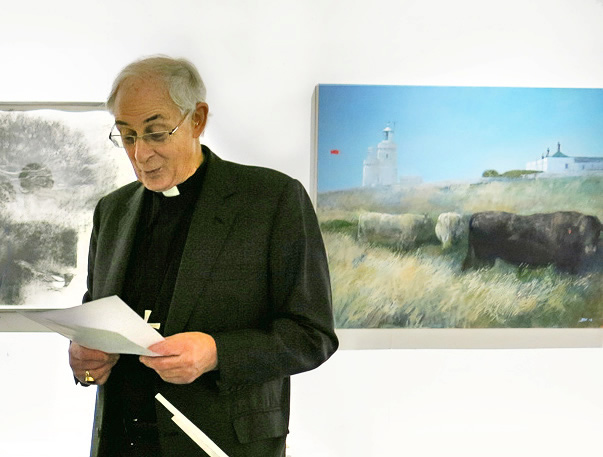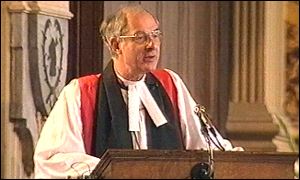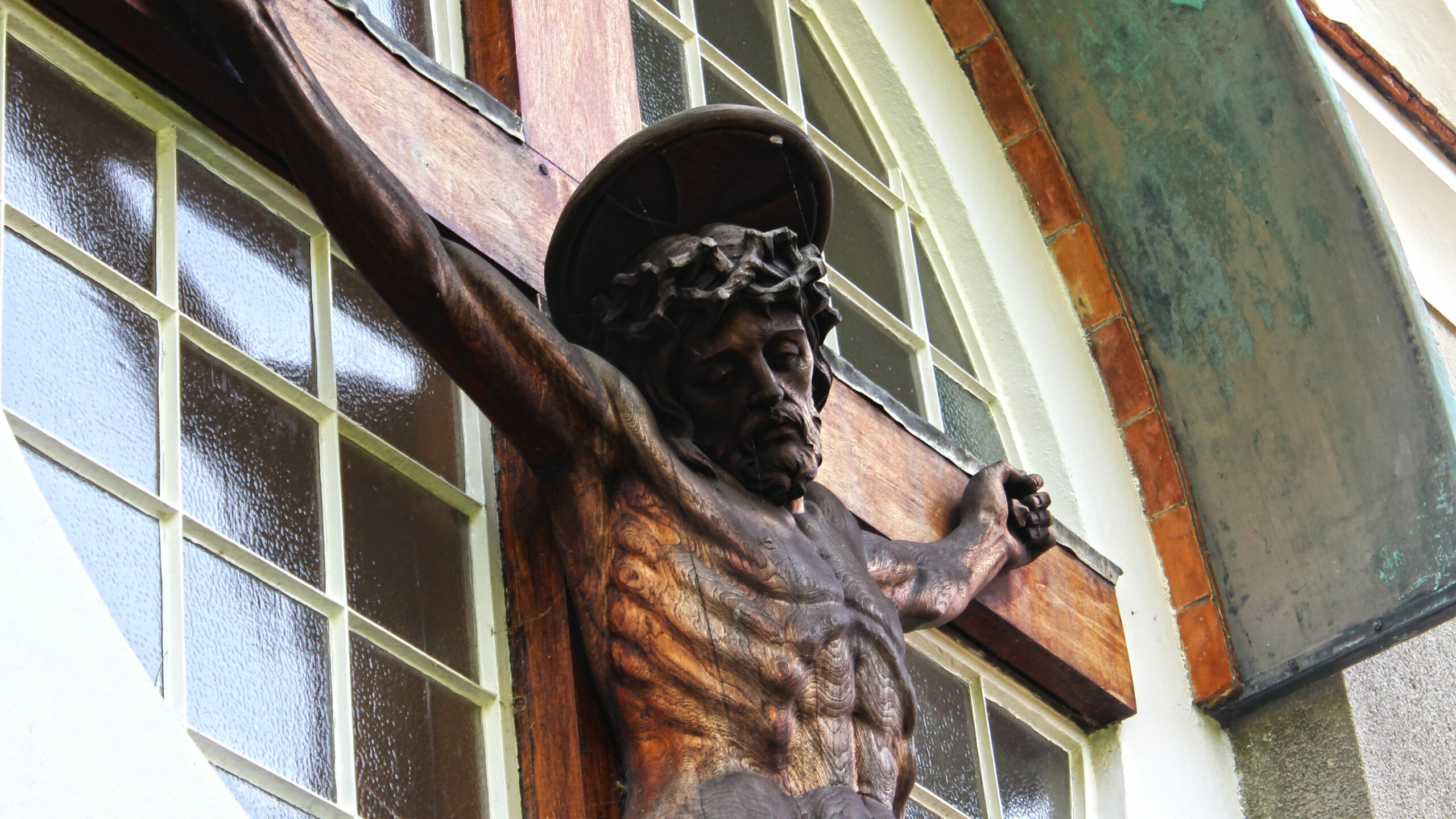Our beloved father, Mark Santer, died at home on Wednesday 14th August. Over the last years and months, his numerous health issues were catching up with him.He died peacefully at home with all of us at his side. He bore these last difficult days in a spirit of deep faith in God, and his mind remained as sharp as ever. We witnessed his lack of fear, his sense of peace, his content and preparedness.https://marksanter.muchloved.com
I want to say three things about Mark which I believe reflect his distinctive and generative ministry as Bishop of Birmingham.
Mark as Pastor
The first is that he cared very much about his clergy. In moments of difficulty or crisis he was a skilled and careful listener, a compassionate and careful pastor. I can think of several situations over those nearly 20 years in Birmingham where his care and encouragement what transformative for individuals lives and ministries. This was helped by his energy and commitment to knowing the Diocese and the City.
He cared also about the flourishing of clergy and their ministerial development. In 1996 and aware that I was finding it increasingly difficult to carve out time for my doctoral studies I was offered half time parochial post looking after two rural parishes east of Sutton Coldfield. This gave me sufficient space to complete the work. At several points and the writing up the skill of his incisive mind add attention to some clumsy use of sentence structure assisted in the completion of the work. Looking back it was hugely significant turning point and has shaped my ministry ever since.
There was of course some ‘payback, when in 1998 he invited me to explore the ministry at Temple Balsall. This charity established in 1674 by Lady Katherine Leveson supported the work of the provision of housing and care for older people alongside a Church of England school and a parish church serving a scattered rural community. After due process I was appointed and again Mark was clear about both the problems but also the possibilities of work there.
Two years later and with his support I established the Leveson centre for the study of Ageing Spirituality and Social Care. It was clear that both Church and Society needed to engage more creatively and strategically with longevity and increased numbers of older people.
Mark as Theologian
The second thing I want to say about Mark relates to the quality of his mind at his intellectual capacity to absorb a very wide range of thinkers, histories, philosophies, and theologies. I hope that other obituaries will articulate his significant contribution to ecumenism through his work with the Anglican–Roman Catholic International Commission https://www.anglicancommunion.org/ecumenism/ecumenical-dialogues/roman-catholic/arcic.aspx He worked especially well with Cormack Murphy O’Connor and enjoyed entertaining clergy with various stories of their encounters around the Commission table and international visits. Many Birmingham clergy will remember a visit to Swanwick of Carlo Maria Martini who inspired us all with his work in Milan amongst younger people as he gathered them together to break open scripture.
Mark kept on searching. He kept on reading and sharing the fruits of that reflective work with others. This relates to another element of the distinctiveness of Mark’s Episcopal ministry. He was a very skilled communicator of the faith. Sermons were always inspiring. They were carefully crafted. He took scripture seriously as it was opened up for us. On Maundy Thursday when his clergy gathered in the cathedral to renew their ordination promises Mark preached powerful and challenging sermons about faith, ministry and our place in the world. Unafraid to challenge lazy thinking and sometimes inappropriate practise in ministry he always lifted his listener into a different place. His theological dexterity and learning were both significant and inspiring.
Mark as Bishop
Birmingham today is a vibrant and diversity that holds together a whole range of beliefs, religions and cultures. As a Diocese it has experienced a shift in numerical strength as, in some regards, Christianity has become more marginal. As with all change there is within these shifts both challenge and opportunity.
Mark was clear about the role of a Bishop and fearless about speaking the truth to power. In a sermon in Birmingham cathedral to those working in the health service in the early 90s he critiqued the introduction of the internal market into the health service. He posed some fundamental questions about ethos and values as they related to care and the value base of our relationship to the patient. It hit a raw nerve with government but some of what he shared on that occasion has proved both wise and true. It matters what we value and the framework within which we attach significance to our identity within public institutions.
Mark had a rare ability to step into a space and engage with a wide variety of people especially those holding public office in the city. People both liked him and admired him as a leader and thinker. Politicians from across the political divide appreciated his support and encouragement. However, the price of this was sometimes to listen to his concerns and questions. In 1997 Birmingham City Council wanted to draw people from across the conurbation into the city to celebrate Christmas. Their marketing tag was Winterval. Mark responded with clarity describing it to be “a way of not talking about Christmas”. In “well-meaning attempt” to be inclusive and not to offend he wondered whether Christianity had been censored.
Mark was unusual amongst his episcopal contemporaries through his questioning of the role of bishops in the House of Lords and especially the establishment. It was not a forum that he felt much committed to or indeed convinced by. While he did his duty and fulfilled his responsibilities it left him uneasy, I think, about aspects of establishment which he was open about. It was unsurprising that he expressed some ambivalence when I moved from Temple Balsall to a Canonry at St Georges Windsor 2009.
In 2002 as he approached retirement he made a speech to his diocesan Synod reflecting on his belief that monarchy might end within the next half century and that within this change the church should reposition itself.
“Without in any way denying that we have served parliament well in the past, we should now withdraw. We have plenty to do in attending to our primary tasks in our dioceses. By sensible use of the media, we can be at least as effective in making our views known on issues of public policy as we can by going to the House of Lords.”
Realistic and insightful he gloried in the fact that
“as bishop of Birmingham, I have not found myself weighed down by symbols and monuments of faded power. There are no rags of ancient privilege for us to presume on, or for others to resent. We can claim attention only on the basis of what we deliver.”
Honesty and a singular integrity undergirded the clarity and focus of his episcopal ministry. He showed us what courage and integrity looked like ! I treasure a note he sent me on my appointment into theological education at Sarum College. Happily I was glad to reflect on these things over lunch in his flat overlooking the Poole Harbour and to express my appreciation of both his ministry and encouragement. We shall not see the like of him again.
I end with words used by his much beloved family
There we shall rest and we shall see; we shall see and we shall love; we shall love and we shall praise.
That is what shall be in the end without end. For what is our end but to arrive at the kingdom which has no end?
From St Augustine’s City of God, translated by Mark Santer
May ‘flights of angels sing thee to thy rest’





Thanks, James. That is a very insightful reflection about a great priest and bishop. Mark was a significant figure for many of us who had the privilege of knowing him and being taught by him. He was equally challenging and encouraging. In the Runcie tradition he gathered great teams – John Armson, Rowan Williams and Mary Tanner at Westcott. He worked closely and theologically on the issues of the day, speaking with clarity and Christian insight. Thanks be to God for Mark Santer. Let light perpetual shine upon him.
Thank you James
Bishop Mark was so good to me, overseeing my call to ordination with Marlene DDO. He offered me two great curate appointments i turned both down. But welcomed me back to Pype Hayes with some wonderful insights. We finally caught up in Kings Heath and shared stories.
Nigel Traynor
Beautifully written James. No wonder whenever I had occasion to visit him when he was an in-patient and I was a hospital chaplain, I always left feeling that I was the one that had been ministered to. So much to miss about him but so much to celebrate too. I’m smiling as I write this, remembering his wonderful voice and beautiful smile.
Thank you James. A fitting reflection and tribute to a man whose legacy in the Church will live on. We are all the poorer for his loss. For those of us who follow after, we can honour him by continuing transforming and challenging, with integrity and authenticity.
Thanks, James. Mark was very significant in my own vocation when he was in Kensington, deciding to send me off to what was then an ACCM selection conference within 15 minutes of meeting me. He had a razor sharp mind combined with the ability to listen intently; in one brief conversation following my return from a year in Pakistan he asked more perceptive questions and got me to think about my experience more than anyone else. Wise, insightful, warm, direct, and human – just what being a priest is about.
Mark held together a warm and grounded pastoral heart with a sharp and questing intelligence. This could demand much of him in episcopal ministry. He was the senior church leader with the least guile that I ever encountered. He had a deep appreciation of the Christian spiritual tradition and a capacity to point you in the right direction when it came to its sources. His admonition to read the Desert Fathers has sustained me throughout my life and ministry. A Westcott contemporary wrote a poem about Mark which ended with the words: “I’ll catch you if you fall.” And he did, for many of us.